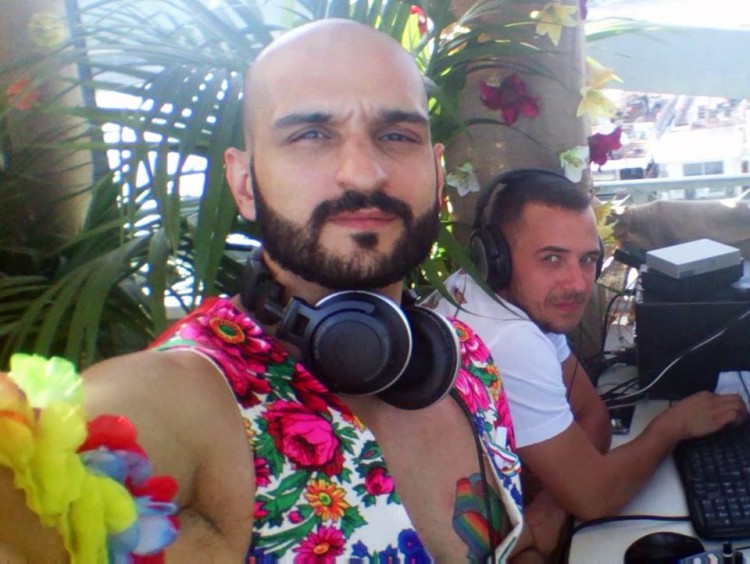Dezső Máté is a Junior Research Fellow at the Hungarian Academy of Sciences’ Institute for Minority Studies whose work focuses on the fate of a minority within a minority: namely the treatment of Gay Roma in Hungary within their own ethno-cultural community. In the past, he has also explored the survival of Roma languages and the representation of minorities within the Hungarian media. Mr. Máté believes that homophobia is a problem within all of Hungarian society, but in some cases “coming out” may, indeed, be more difficult for a Roma youth than for a non-Roma Hungarian. “One man I interviewed told me that because he is a Roma, he can only have a Roma wife, who would wear a traditional long dress, would give birth to his children and whose place would be next to the stove. All the while, this man would go off with other men to play card games,” said Mr. Máté of one interview that he conducted within the community.
His most recent work on the Roma LGBT community, however, sparked the interest of the HVG weekly magazine, which published a detailed piece on the fate of Hungarian Roma who are openly gay, and interviewed a handful of researchers and activists. The conclusions are disturbing: anti-Roma sentiment is very much present in the LGBT community, while homophobia is a strong force within Roma communities. László Farkas, a popular DJ and musician in Budapest also known as gypsyROBOT.tv, decided to tackle the issue head-on by organizing a separate float for Gay Roma at the Pride March this past summer in the Hungarian capital. The message was clear: both the Roma and LGBT communities had to face their own “demons” and finally address prejudice against “the other.” Mr. Farkas has spoken to dozens of Roma youth about their coming out experiences and noted that stories of attempted suicide, being disinherited by one’s family or talk of “curing” homosexuality is far more common among gay Roma than among gays in the majority population.
“Roma guys who come from a traditional environment already know by 18 years of age who they will marry. I have seen many circumstances when the young man was already married, or had a bride, and only then came to understand his situation”, noted Mr. Farkas when speaking with hvg.hu. Mr. Farkas believes that Hungarian Roma have a much tougher time “coming out” than non-Roma Hungarians, because religiosity and the role of tradition is far stronger within this community than in the majority population. Beliefs within the Roma community around gender roles and masculinity also play a part.
Mr. Farkas has been persistent in his calls for the Roma to tackle prejudice in their own communities. “How can a heterosexual Roma be homophobic, if he expects the broader Hungarian society to accept him?”–asks the Roma activist and entertainer.
When I read this, I detected some parallels with African American communities in the United States and turned to an insightful piece in The Advocate. Some in the community see the accusation of homophobia as an insidious stereotype against blacks in the US. “I know there’s a lot of black LGBT activists who are really angry that we keep on having the conversation about black homophobia. At the same time, black homophobia has not gone away. So it’s a very careful balance of understanding that. Black homophobia is very different than white homophobia,” notes Faith Cheltenham of BiNet USA, herself part of the black LGBT community. According to Ms. Cheltenham, homophobic African Americans are more likely to turn to their church community, in order “cure” their gay son or daughter, while conservative white parents are more likely to simply sever ties with their kids.
Much like with Hungary’s Roma, where religious affiliation tends to be stronger than in the majority Hungarian society, the issue may have less to do with race and ethnicity and much more with church-based prejudice. According to Larry Duplechan, author of the novel Blackbird:
“The center of the black community is the black church, and that changes everything. So coming out in the black community is like trying to come out as an Orthodox Jew. You’ll lose your family. You’ll lose your culture. You’ll lose your community, because usually, you are ejected. Even now, that’s true.”
Andrea Pócsik, a researcher focusing on minorities in Hungary, notes that the higher levels of homophobia among the Roma probably have less to do with specifics of the Roma culture and much more to do with the realities of living in a small and often close knit community. In her reading, if one were to visit a Swabian (ethnic German) village in Hungary, the levels of homophobia may be comparable to those in small Roma communities. “The only difference may be that Roma families fear the impact of compounded discrimination,” adds Ms. Pócsik, in terms of the potential drawbacks of being seen as belonging to two minority groups.
The issue of homophobia in Hungary as a whole will soon draw much more attention. The Fidesz party’s communications director and mayor of Budapest’s 8th District, Máté Kocsis, has launched a lawsuit against liberal politician Klára Ungár, for insinuating that he is gay. Mr. Kocsis is demanding 2 million forints (C$9,300) in damages and a public apology from Ms. Ungár, in which she must concede that she has “damaged Mr. Kocsis’s good reputation and his dignity as a human being by falsely claiming that he is a homosexual.”
This may, indeed, be a landmark court case in Hungary, in which the judge must decide whether claiming that someone is gay qualifies as defamation and whether it is an insult to one’s human dignity.
